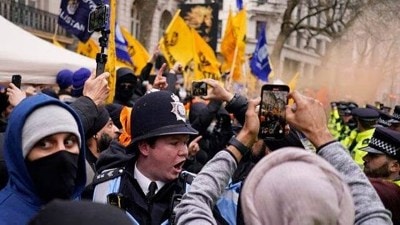- India
- International
Halloween 2017: US colleges to students, skip sombreros, blackface as ‘costumes’
While not outright prohibiting any costume, administrators are using letters, campus forums and advertising campaigns to encourage students to pick outfits that don't offend classmates of colour.
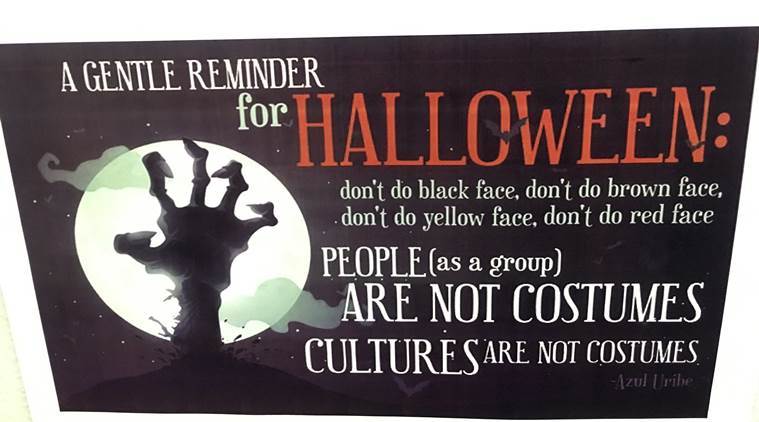 “You wear the costume for one night. I wear the stigma for life,” say some of the Halloween posters at these universities. This poster was displayed on the University of New Hampshire campus in Durham, NH, to encourage students avoid Halloween costumes that can be seen as racially or culturally offensive. (Source: AP)
“You wear the costume for one night. I wear the stigma for life,” say some of the Halloween posters at these universities. This poster was displayed on the University of New Hampshire campus in Durham, NH, to encourage students avoid Halloween costumes that can be seen as racially or culturally offensive. (Source: AP)
Universities are urging students in search of an attention-grabbing costume this Halloween to pass on sombreros, Native American headdresses and blackface. Those are some of the costumes grabbing the attention of university administrators who are increasingly concerned that certain costumes are becoming flashpoints in campus debates over race and culture. While not outright prohibiting any costume, administrators are using letters, campus forums and advertising campaigns to encourage students to pick outfits that don’t offend classmates of colour.
Some, like the University of Texas at Austin, issued a flyer encouraging students to consider how a costume aligns with an organisation’s values and whether it is “reflective of a certain racial group, gender, and/or economic class.” It also includes a list of harmful themes or costumes: any painting or tinting of skin, stereotypes of Asian culture, cowboys and Indians, or south of the border/fiesta. Comic book heroes and time period themes are fine.
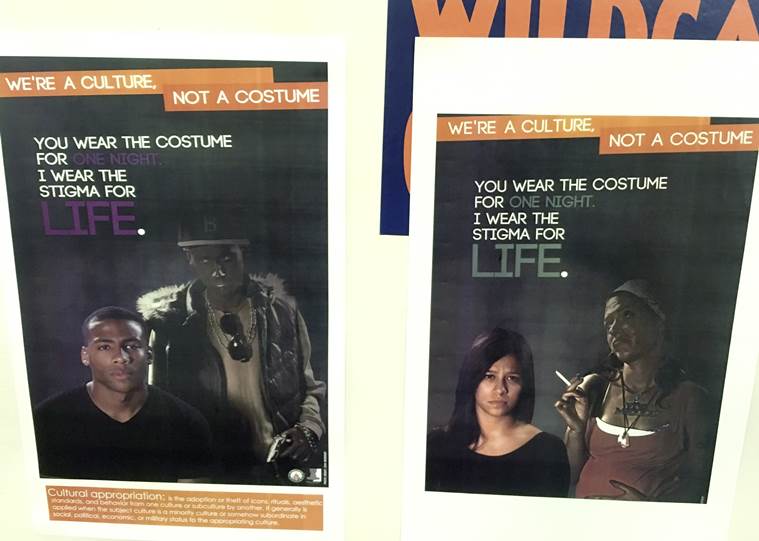 Administrators at some universities across the country are increasingly concerned that certain costumes are becoming flash points in the campus debate over race and culture. (Source: AP)
Administrators at some universities across the country are increasingly concerned that certain costumes are becoming flash points in the campus debate over race and culture. (Source: AP)
At Southern Utah University, dozens of billboards have been put up and shared on social media with the message, “My Culture is not a Costume,” along with images of students of colour holding photos of people wearing costumes from their race or culture. Similar poster campaigns have spread to other schools, including the University of Denver and University of New Hampshire.
“We launched it during this time because … Halloween is when we start to see a lot of those offensive costumes,” said Maria Martinez, Southern Utah’s director of the Center for Diversity and Inclusion, who says she got the idea from Ohio University. “Students wanted to send a reminder because they do feel disrespected when someone shows up in a costume that represents their culture, particularly when it’s an inaccurate stereotype.”
Supporters see the campaigns as a chance to start a conversation about cultural appropriation — adopting aspects of someone else’s culture — and to educate students about their own cultures and about why dressing as a Mexican immigrant or Pocahontas might be a problem.

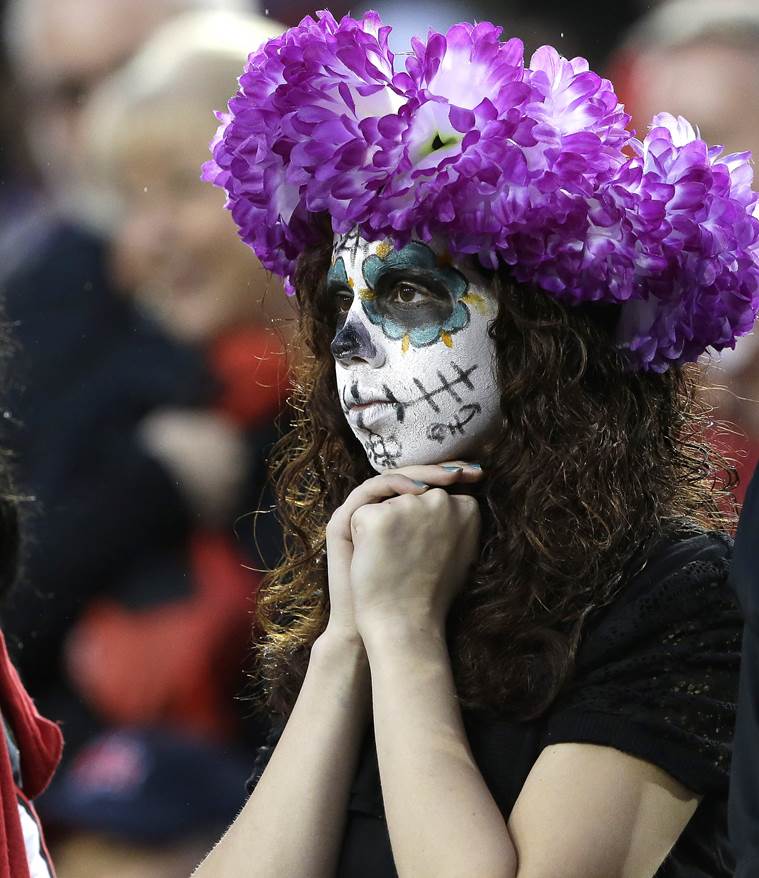 In this October 31, 2015, file photo, a Houston fan is dressed for Halloween during an NCAA college football game against the Vanderbilt in Houston. Administrators at some universities across the country are increasingly concerned in 2017 that certain costumes are becoming flash points in the campus debate over race and culture. While not outright prohibiting any costume, administrators are using letters, campus forums and advertising campaigns to encourage students to pick outfits that don’t offend their classmates of color. (Source: AP)
In this October 31, 2015, file photo, a Houston fan is dressed for Halloween during an NCAA college football game against the Vanderbilt in Houston. Administrators at some universities across the country are increasingly concerned in 2017 that certain costumes are becoming flash points in the campus debate over race and culture. While not outright prohibiting any costume, administrators are using letters, campus forums and advertising campaigns to encourage students to pick outfits that don’t offend their classmates of color. (Source: AP)
“A lot of people are like I am, just wearing a poncho like I’m not trying to appropriate a culture,” said Juan Gomez-Rivadeneira, a 21-year-old member of the University of New Hampshire’s Latino student association Mosaico. He says they have to know why people view it a certain way, even though it wasn’t their original intention.
Critics see the move as another example of political correctness and fear it will lead to a host of costumes being prohibited and turn students off from celebrating Halloween. In 2015, a Yale University faculty member resigned after her calls for students to push boundaries with Halloween costumes sparked protests. She was responding to calls by the university for students to avoid wearing racially insensitive costumes. “The cultural temperature on this has gotten so high that nothing is appropriate anymore. We are getting to the point where prohibition is the rule,” said Michael Rectenwald, a professor of Global Liberal Studies at New York University, who has criticised Halloween costume policies.
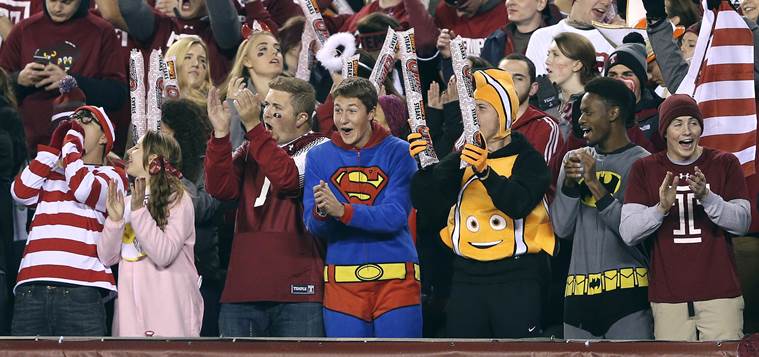 In this October 31, 2015, file photo, Temple fans, some in Halloween costumes, cheer during an NCAA college football game against Notre Dame in Philadelphia. (Source: AP)
In this October 31, 2015, file photo, Temple fans, some in Halloween costumes, cheer during an NCAA college football game against Notre Dame in Philadelphia. (Source: AP)
Inspired by several racial incidents at UNH this year, including white students wearing ponchos and other Mexican attire during Cinco de Mayo, the Student Senate earlier this month passed a resolution calling on the administration to denounce the “insensitivity of acts of cultural appropriation and racism that commonly occur when students celebrate Halloween.” A letter from administrators was sent to students this week encouraging them to be respectful of others heritages.
Students at UNH said they’d seen the Halloween posters in their resident halls with the message, “You wear the costume for one night. I wear the stigma for life.”
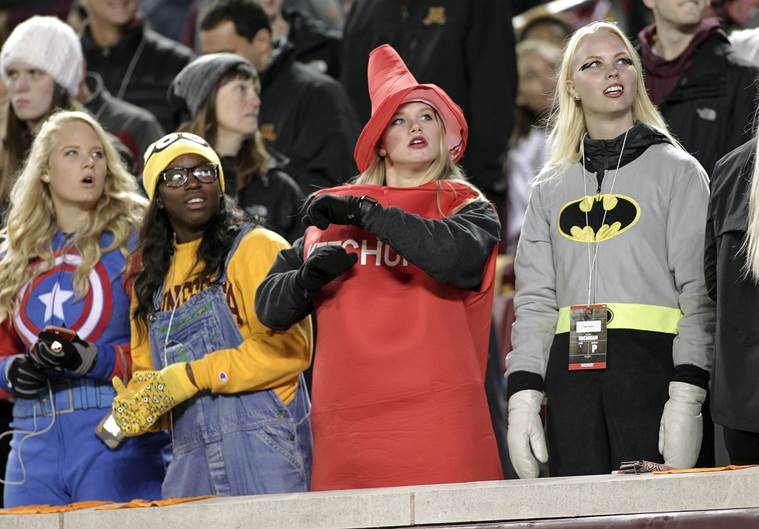 In this October 31, 2015, file photo, Minnesota fans celebrate Halloween during the first half of an NCAA college football game between Minnesota and Michigan in Minneapolis. (Source: AP)
In this October 31, 2015, file photo, Minnesota fans celebrate Halloween during the first half of an NCAA college football game between Minnesota and Michigan in Minneapolis. (Source: AP)
Many said they understood the concerns, and a few said it had them reconsidering costume choices — including a student who was talked out of wearing a Native American chief’s attire. Others said it was unnecessary for the school to suggest what they wear and complained that their decision to wear an ethnic costume was aimed at celebrating a culture, not mocking it. Others feared that the campaign only sowed confusion, leaving students wondering if any costume was safe.
“I’m kind of 50-50 on it. I feel like it’s dramatic. They are being a little excessive,” said Sarah Smith, a 19-year-old UNH sophomore. “I definitely feel the knowledge is good and that people should respect other people. But I also believe that literally any costume that somebody wears, somebody can find a problem with it.”
More Lifestyle
Apr 26: Latest News
- 01
- 02
- 03
- 04
- 05


